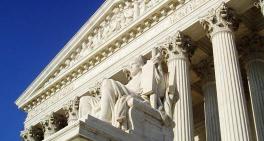U.S. Bankruptcy Courts I
United States Courts
Bankruptcy helps people who can no longer pay their debts get a fresh start by liquidating assets to pay their debts or by creating a repayment plan. Bankruptcy laws also protect financially troubled businesses. This section explains the bankruptcy process and laws.
Alabama Middle - ECF
Alabama Northern - ECF
Alabama Southern - ECF
Alaska - NextGen
Arizona - ECF
Arkansas Eastern - ECF
Arkansas Western - ECF
California Central - ECF
California Eastern - ECF
California Northern - ECF
California Southern - NextGen
Colorado - ECF
Connecticut - ECF
Delaware - ECF
Related listings
-
U.S. Courts of Appeals
United States Courts 07/30/2017There are 13 appellate courts that sit below the U.S. Supreme Court, and they are called the U.S. Courts of Appeals. The 94 federal judicial districts are organized into 12 regional circuits, each of which has a court of appeals. The appellate ...
-
U.S. Supreme Court
United States Courts 07/30/2017U.S. Supreme Court The Supreme Court is the final judge in all cases involving laws of Congress, and the highest law of all — the Constitution. The Supreme Court, however, is far from all-powerful. Its power is limited by the other two branches...
-
National Courts
United States Courts 06/30/2017Judicial Panel On Multidistrict Litigati - ECF U.S. Court Of Federal Claims - ECF U.S. Court Of International Trade - ECF

CHICAGO BUSINESS & CORPORATE LITIGATION LAWYERS
When faced with a legal challenge, your attorneys should help you identify your goals at the beginning of the process. Thereafter, every action that follows must be undertaken with the aim of meeting those goals. Wasted effort equals wasted time and money, that’s something you cannot afford and your attorneys must respect this concept. At Roth Law Group, we counsel our clients to confront their legal challenges aggressively, but with purpose.
As a former Marine Corps Pilot, I learned that you must assess the situation, determine your mission, construct a plan to achieve the mission and execute that plan. As an attorney and small business owner, I apply the same concepts in taking on my client’s legal challenges. And while it is generally preferable to resolve cases early in the process whenever possible, if you have no choice but to fight, you need someone who is willing to aggressively advocate for you. Here at Roth Law Group, we never back down from a challenge and we fight to win. Let our experienced attorneys put you in control of your legal challenges so you can get back to running your business.




